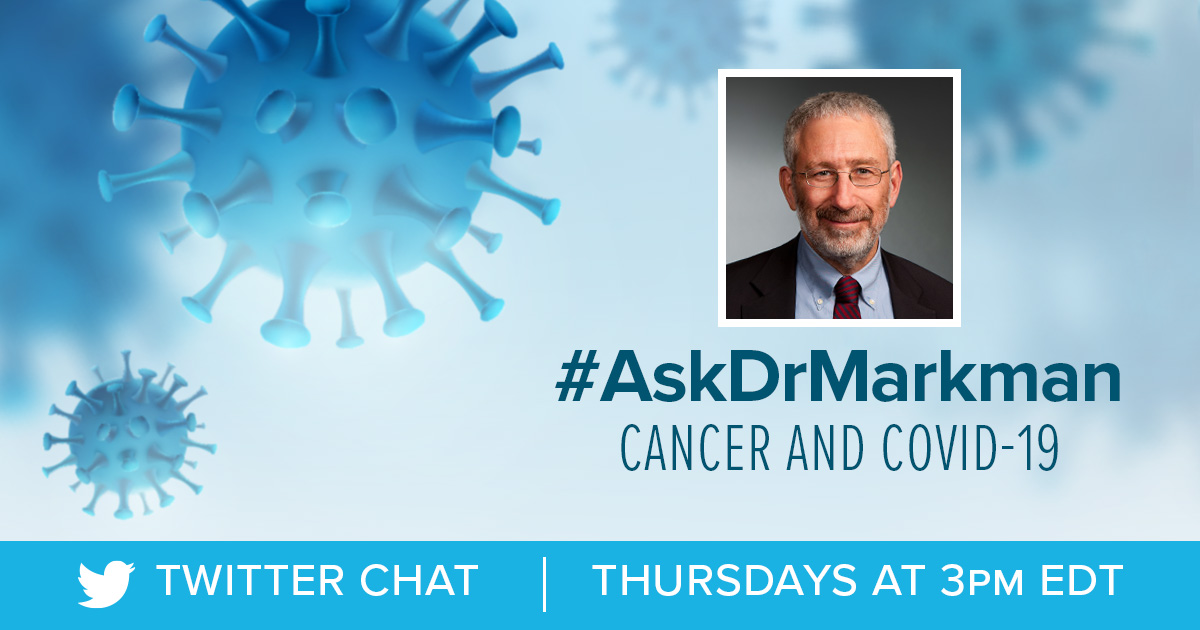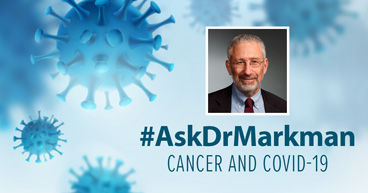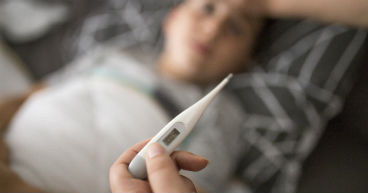
The COVID-19 pandemic has created a constantly evolving flow of new and sometimes confusing information. Cancer patients have many questions about how the virus may affect them, their access to ongoing treatments, their overall health and steps they can take to help reduce risk of infection. Maurie Markman, MD, President of Medicine & Science at Cancer Treatment Centers of America® (CTCA), has launched a weekly Q&A hosted on Twitter to answer your questions, in real time and as questions are sent to us online and by phone. Follow us at #AskDrMarkman. Here’s this week’s chat:
Question: As both an elementary school teacher and cancer survivor, I’m keeping a close eye on developments in treating COVID-19. I understand there’s an antibody being tested as a possible treatment.
Answer: Yes, a neutralizing antibody originally isolated from a COVID-19 patient is being tested in individuals who have symptoms and a positive test for COVID-19 but are not hospitalized. The goal here will be to see if the delivery of this antibody can prevent further progression of the disease, including the need for hospitalization and other serious consequences.
Q: As schools begin to reopen, I’m concerned about my child getting COVID-19 and possibly infecting my father, who just completed colon cancer treatment. Do you know how likely it is for children to spread the virus?
A: The medical community continues to accumulate valuable information regarding the risk of COVID-19 spread in school-aged children who are together for extended periods of time. A recent U.S. Centers for Disease Control and Prevention (CDC) report on the rapid and extensive transmission of COVID-19 among those attending an overnight camp in Georgia, where young campers were not required to wear masks, has shown how easily such transmission can occur. When schools reopen, it will be critical for all involved, including teachers, staff and students, to carefully follow planned social distancing and mask requirements, in addition to rapid reporting of any relevant symptoms.
Q: Are cancer patients at risk for developing a serious COVID-19 infection if they have to be in the hospital for non-COVID-related reasons?
A: This is an important question that could impact all cancer patients, but we still have limited information to answer it. However, a recent report from one center noted that about 20 percent of its cancer population who developed COVID-19 did so after contact while hospitalized for a non-COVID-19-related health reason. The report also noted that the morality rate among the hospitalized group was considerably higher than for cancer patients who developed the virus from a community (rather than hospital) exposure. These data underscore the critical need to take great caution to protect hospitalized cancer patients from COVID-19.
Q: Is the COVID-19 pandemic having any impact on the number of adolescents who are getting the HPV vaccine?
A: I’m unaware of information regarding HPV vaccination specifically, but a recent report noted that, during the pandemic, children aged 7-17 had 70 percent fewer visits to physicians who routinely administer essential vaccines, including for HPV. In fact, The American Cancer Society has launched a campaign to alert the medical community and parents regarding the importance of HPV vaccination in both girls and boys aged 9-12.
Q: I know there’s concern that the COVID-19 pandemic may impact people’s willingness to seek care for other conditions, but is there actual evidence it has affected the number of people diagnosed with cancer?
A: The medical community has expressed strong and appropriate concern that a number of serious medical conditions, including cancer and heart disease, will not be managed in a timely manner. A recent report examining the cancer rate in a large population database from Jan. 6, 2020, to Feb. 29, 2020, vs. March 1, 2020, to April 18, 2020, puts this concern in striking relief. The report noted a 46.4 percent reduction in the weekly diagnosis of six evaluated cancers combined, ranging from a 24.7 percent drop in pancreatic cancer diagnoses to a 51.8 percent decrease in breast cancer cases.
Q: As a cancer survivor, I know how important the immune system is in fighting disease. Is there any evidence that people with no prior exposure to COVID-19 may have some level of immunity based on prior infections with other viruses?
A: This is a very interesting question, and the scientific community has paid considerable attention to trying to answer it. In fact, a recent report has suggested that some individuals with no prior exposure to COVID-19 appear to have immune cells that are quite reactive in a positive manner when exposed to the virus. It’s been speculated that this results from prior exposure to other, but far less virulent, viruses that are in the same class as COVID-19. It’s still unknown if these cells will improve a patient’s outcome if he or she gets infected with the virus.
Q: My primary care physician recently started resuming normal visits, which was great news, since I’m getting follow-up care here after completing cancer treatment. Have primary care practices been greatly impacted by the pandemic?
A: Unfortunately, the answer is yes. One report noted that 40 percent of primary care practices in the United States had to furlough staff and 7 percent were required to close temporarily. In another survey, one in three people said they were unable to get a preventive care appointment, including for cancer screening, while 20 percent of those with chronic illnesses, which may include cancer, had their visits delayed.
Q: Several members of my family are being treated for cancer, so I’m very interested in the potential for a COVID-19 vaccine. Based on what’s known today, will the vaccine have to be delivered in two doses or will one dose be effective?
A: While it’s not yet possible to offer a definitive answer, there are obvious potential benefits of a single vaccine dose, compared to two (or more), in terms of the overall costs as well as the time and effort required to vaccinate the population. It’s likely a “booster dose” of a vaccine will increase the immune response, but it’s not yet known if that will be required to achieve an adequate degree of immunity to prevent, or at least reduce the seriousness of, a COVID-19 infection. In animal models, there’s evidence that certain vaccine candidates under investigation may only require a single dose, while others may require two doses. But the actual results of ongoing clinical trials are mandated to specifically address this question.
Q: Is there any update on the benefits of using plasma from recovered COVID-19 patients to treat a serious COVID-19 infection? I’m interested because my mother was recently diagnosed with both low-stage breast cancer and COVID-19.
A: So far, most of the literature regarding convalescent plasma therapy involves individual cases or small series of patients whose outcomes have generally been compared to other patients at the same facility who didn’t get the same treatment. However, a small, randomized trial from China began to explore the potential. Unfortunately, the study was stopped early because of an inadequate number of available patients with active COVID-19 infections. While the study failed to show statistically significant improvement in the primary outcome (likely due to inadequate patient numbers), it did show some promising effects on relevant parameters, including the time it took for the infection to clear up. We now await the results of other research efforts that are also underway to study convalescent plasma therapy’s impact on serious COVID-19 infections.
Q: I recently saw that Russia plans to begin to vaccinate its population against COVID-19, but I’ve heard little about its vaccine. Do we have any information about it?
A: Unfortunately, the clear answer is no. In fact, as of this date, there have been no peer-reviewed publications in any major medical journal regarding either the safety or efficacy of any COVID-19 vaccine being produced in Russia. While there’s nothing to stop any country from a mass vaccination effort, there are genuine safety concerns without the international scientific and public health communities’ open, objective review of claims about benefits vs. risks of a COVID-19 vaccine.
Learn how drugs developed for other diseases may be used to treat cancer.



